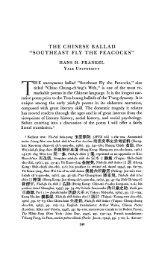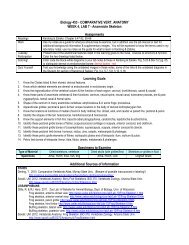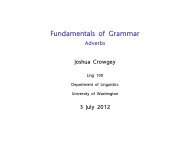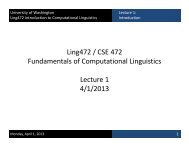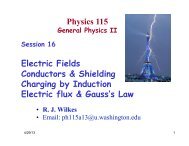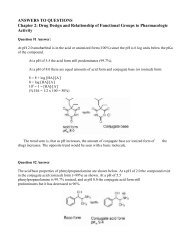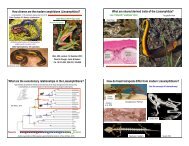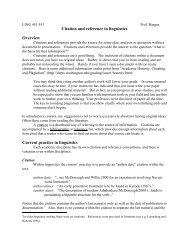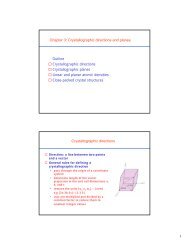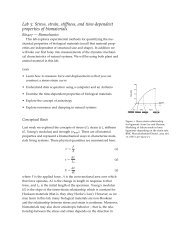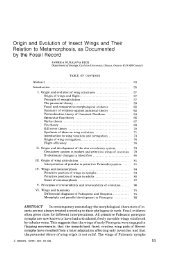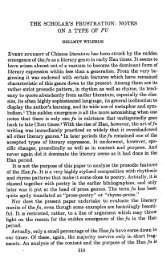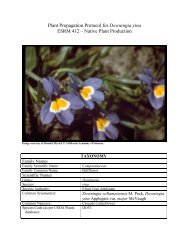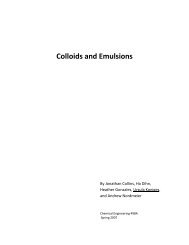The Changing Oceans Section A (Lecture) - UW Courses Web Server
The Changing Oceans Section A (Lecture) - UW Courses Web Server
The Changing Oceans Section A (Lecture) - UW Courses Web Server
Create successful ePaper yourself
Turn your PDF publications into a flip-book with our unique Google optimized e-Paper software.
Winter 2010<br />
<strong>Section</strong> A (<strong>Lecture</strong>):<br />
<strong>Lecture</strong>: MTWF 1:30-2:20pm, Kane 110<br />
Quiz <strong>Section</strong>s: TH 12:30-1:20 or 1:30-2:20<br />
OCEAN 102: <strong>The</strong> <strong>Changing</strong> <strong>Oceans</strong><br />
<strong>Section</strong> B (Internet): Required information session on Jan 8 th and exams on January 15 and 29, February<br />
12 and 26, and March 12.<br />
Instructors: Dr. Mikelle Nuwer and Richard Strickland<br />
Office Hours: 2:30-3:30pm on non-exam Fridays in Smith 120 or by appointment<br />
Email: ocean102@uw.edu<br />
Teaching Assistants:<br />
Kailey Genther (<strong>Section</strong> AA) Amy Cash (<strong>Section</strong>s AB & AD)<br />
Office Hours: TH 12:30-1:15PM Office Hours: F 11:30AM-12:30PM<br />
Email: sea102aa@uw.edu Email: sea102ab@uw.edu<br />
Jesse Anderson (<strong>Section</strong>s AC & AE) Paul Rudell (<strong>Section</strong>s AF & AG)<br />
Office Hours: TH 10:00-11:00AM Office Hours: TH 11:30AM-12:15PM<br />
Email: sea102ac@uw.edu Email: sea102ad@uw.edu<br />
Clara Fuchsman (<strong>Section</strong> BA) Michele Guannel (<strong>Section</strong> BB)<br />
Office Hours: F 12:30-2:15PM Office Hours: TH 2:00-4:00PM<br />
Email: sea102ba@uw.edu Email: sea102bb@uw.edu<br />
Lia Slemons (<strong>Section</strong> BC)<br />
Office Hours: F 9:30-11:15AM<br />
Email: sea102bc@uw.edu<br />
All office hours are held in the Design Coffee Shop in Gould Hall. You may attend the office hours of any<br />
TA, even if they are not your section TA.<br />
TEXTS: Mapping the Deep by Robert Kunzig (WW Norton & Company) and <strong>The</strong> <strong>Oceans</strong> by Ellen Prager<br />
(McGraw-Hill). Both available at the University Bookstore and on reserve in OUGL. Additional readings<br />
available on electronic reserve (ERES) through the course website.<br />
Course <strong>Web</strong> Site: http://courses.washington.edu/ocean102<br />
<strong>The</strong>re are no formal course requirements as prerequisites for OCEAN 102.<br />
Ocean 102 has been designed to present an alternative view of basic oceanography. <strong>The</strong> focus of Ocean<br />
102 is on how people interact with the marine realm. Ocean 102 takes a historical approach to Natural<br />
World credit, with readings on the past oceans [ancient oceans and marine life, deep-sea exploration], the<br />
present oceans [stressed species and habitats], and the future oceans [climate change]. We also look at<br />
Individual & Society topics including the lives of ocean scientists, changing attitudes toward the oceans<br />
and marine life, and ocean-related social controversies such as evolution and climate change.<br />
Topics are divided into five, two-week units. An exam is administered at the end of each unit (on alternate<br />
Fridays).<br />
1
Winter 2010<br />
This course satisfies either a natural world (NW) requirement for students majoring in other fields or an<br />
Individuals & Society (I&S) requirement.<br />
EVALUATION<br />
To assess your learning and progress, there will be a variety of instructional activities: 1) lectures, where<br />
students will learn basic facts and concepts, 2) readings, where students will interpret facts in relation to<br />
scientific history and theories, 3) quizzes, where students will be asked to interpret facts and apply the<br />
information presented in lecture, and 4) in-class exams.<br />
1) <strong>Lecture</strong>s: <strong>Lecture</strong>s are posted in Adobe PDF through the “<strong>Lecture</strong>s” link on the course website by noon<br />
on the day of each lecture. You’ll need your <strong>UW</strong> Net ID to log in.<br />
To view the video and audio of each lecture, follow the link to “Screencast” on the course website or link<br />
directly to: http://www.css.washington.edu/course/OCEAN102A<br />
Again, you’ll need to use your <strong>UW</strong> Net ID to log in.<br />
2) Readings: <strong>The</strong>re are two required textbooks for the course. Both are available in the University Bookstore<br />
and on reserve in OUGL. Additional readings are available on electronic reserve (“ERES” link on course<br />
website). During the quarter students are expected to study the assigned reading in the texts and view<br />
additional specified websites and online readings (ERES) to learn about interesting events and developments<br />
in ocean sciences too recent to be included in the texts.<br />
3) Quizzes: <strong>The</strong>re are five quizzes during the quarter. Each quiz is worth 20 points. <strong>Section</strong> A students take<br />
the quizzes in Quiz <strong>Section</strong>. <strong>The</strong> quizzes for <strong>Section</strong> B students will be administered through Catalyst <strong>Web</strong>Q.<br />
<strong>The</strong> quizzes will be posted through a link on the course website the first Thursday of each unit at noon and<br />
will be close at noon on Friday.<br />
Quizzes will be administered on Thursday 7 and 21 January, 4 and 18 February, and 4 March. <strong>The</strong>re are no<br />
make-up quizzes, but your lowest quiz score will not be calculated in your final grade.<br />
4) Exams: <strong>The</strong>re are five exams during the quarter. Each exam is worth 80 points. Exams are written in the<br />
multiple choice format and are non-cumulative. Exams dates are 15 and 29 January, 12 and 26 February,<br />
and 12 March. <strong>The</strong>re is no final exam.<br />
Please bring a scantron to each exam. Your lowest exam score is dropped when calculating your final<br />
grade. We only offer make-up exams for <strong>UW</strong> athletic or academic events. If your event qualifies, please<br />
contact your TA in advance with documentation.<br />
Extra Credit: Several extra credit assignments will be offered during the quarter. Descriptions and details<br />
for the assignments will be posted on the course website. Each student can only earn 20 points of extra<br />
credit.<br />
GRADING<br />
Each of the five units is worth 100 points. Your lowest quiz score and exam score is dropped before<br />
calculating your final grade. <strong>The</strong>refore, there are 400 possible. Your grade is calculated based on the<br />
percentage of points earned:<br />
Exams: 80%<br />
Quizzes: 20%<br />
2
Winter 2010<br />
If you score above 90%, your grade is in the "A" category (3.5-4.0), and if your score is between 80% and<br />
90% your grade is in the "B" category (2.5-3.5), etc. Final grades will be based on the highest point value<br />
earned by a student in the class, not the total possible points assigned.<br />
STUDENT ATHLETES: <strong>The</strong> Student Athlete Travel Notification form (supplied by the Department of<br />
Intercollegiate Athletics) indicating which classes will be missed must be turned in to instructors at the start<br />
of the quarter. We will discuss how you can fulfill the requirements.<br />
ACADEMIC ACCOMMODATIONS: To request academic accommodations because of a disability,<br />
please contact the Disability Resources for Students (DRS), uwdss@u.washington.edu, 448 Schmitz Hall,<br />
206-543-8924. Please present a letter at the start of the quarter to the instructors so we can provide<br />
appropriate accommodations.<br />
ACADEMIC HONESTY: <strong>The</strong> following information is extracted from the <strong>UW</strong> web site on academic<br />
honesty:<br />
“You are guilty of cheating if you present as your own work something that you did not do. You are also<br />
guilty of cheating if you help someone else to cheat.”<br />
“You will be expected to live up to the University's standards of academic honesty no matter what<br />
temptations you face. <strong>The</strong> good news is that this standard is not hard to maintain. It only requires that you<br />
clarify assignments and procedures with your instructors, that you study diligently, and that you seek help<br />
when you need it.”<br />
Examples of cheating include, but are not limited to the following activities: attempting to pass others’<br />
work as your own (i.e., plagiarism), using crib sheets, or providing exam answers to other students. If you<br />
have any uncertainty as to which activities are defined as cheating, please visit:<br />
http://depts.washington.edu/grading/conduct/honesty.html.<br />
You will work independently on quizzes and exams. If we determine that you have cheated, you will be<br />
given a zero for the assignment. If we determine that you have cheated a second time, we will report you to<br />
the Dean of the College of Ocean and Fishery Science and the Vice Provost for Student Life. <strong>The</strong> student<br />
accused of cheating has the right to appeal to the Dean’s representative. We expect all students “to maintain<br />
the highest standards of academic conduct.”<br />
3



